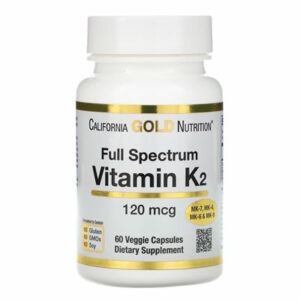Vitamin K is a less-discussed fat-soluble vitamin (another vitamin A, vitamin E, and vitamin D) that was first discovered in the 1939s, and the name comes from the Danish Coagulation. It means blood coagulation and is a key nutrient for maintaining blood coagulation.
What are Vitamin k benefits and side effects?
Table of Contents
- What is vitamin K?
- What are the types and food sources of vitamin K?
- What are the benefits of vitamin K?
- Are there any side effects of vitamin K supplementation?
- Safety Precautions
- Possible symptoms of vitamin K deficiency?
- What are the groups that are prone to lack of vitamin K?
- Where to buy vitamin K recommended by most people?
What is vitamin K?
Vitamin K is a class of structurally similar compounds. In the physiological mechanism of the human body, vitamin K is a molecule necessary for the synthesis of the gamma carboxyglutamate/Gla-protein family, and these processes are also called vitamins.
In addition to the four coagulation factors, this group of Gla-proteins produced by vitamin K plays a key roles in maintaining bone strength, inhibiting calcification of blood vessel walls, maintaining endothelial integrity, participating in tissue renewal, and regulating cell growth. It is no less important than other nutrients, so it is also called a forgotten vitamin.
What are the types and food sources of vitamin K?
There are two forms of vitamin K in our diet: vitamin K1 and K2
Vitamin K1 (phylloquinone) is mainly found in green leafy vegetables or algae foods
Vitamin K2 (menaquinones) is the most biologically active form and has a longer half-life than vitamin K1. It is mainly found in foods of animal origin, such as liver or fermented foods such as yogurt, natto, or by the human intestinal tract. The bacteria are produced directly and can be subdivided into MK-1 to MK-10 according to the number of isoprene units, and MK-7 and MK-4 are the most common.
MK-7 is usually derived from natto, a popular Japanese food made from fermented soybeans. Compared with vitamin K1, the long-term intake of MK-7 in the blood is not only more stable but also higher in concentration (up to 7 to 8 times). It is significantly better distributed in various tissues.
MK-4 is present in animal tissues, or in small amounts in meat and egg yolks.
What are the benefits of vitamin K?
1. Maintain bone health
Osteoporosis is an age-related disease characterized by a decrease in bone mass, which leads to weak bones and an increased risk of fractures.
The cause of osteoporosis may be related to endocrine, abnormal secretion of parathyroid hormone and calcitonin, insufficient intake of vitamin D and calcium, postmenopausal hormonal status, pregnancy, nutritional disorders, drug use, etc.
A meta-analysis of literature (including 17 prospective randomized controlled studies) pointed out that supplemental vitamin K (especially Vitamin K2) can help increase the lumbar spine bone density, but for femoral neck, bone Density has no obvious effect.
Another meta-analysis (meta-analysis, including 19 randomized controlled trials, 6759 participants) pointed out that for postmenopausal women with osteoporosis, additional supplementation of vitamin K2 can help maintain and improve spine bone density, and can reduce the incidence of fractures.
A recent meta-analysis (meta-analysis, including 5 studies, a total of 1114 fracture cases, 80982 participants) pointed out that higher dietary vitamin K intake (mainly vitamin K1) can moderately reduce the risk of fractures.
*Conclusion: The proper intake of vitamin K has a positive effect on bone health and can reduce the incidence of fractures
2. Good for diabetes?
Diabetes mellitus is a group of metabolic diseases characterized by chronic hyperglycemia due to defects in insulin secretion, insulin action, or both.
Due to refined diets and changes in lifestyle, the global prevalence of diabetes has doubled in 30 years, reaching 8.5% of the total population (approximately 400 million people).
Common complications of type 2 diabetes include cardiovascular disease, renal failure, vision loss, nerve damage, etc.
A meta-analysis of literature (including 8 randomized controlled trials, 1,077 participants) pointed out that supplemental vitamin K (whether K1 or K2) does not affect insulin sensitivity (insulin resistance, fasting blood glucose, fasting plasma insulin, C-reactive protein, adiponectin, leptin, interleukin 6 levels).
Another literature meta-analysis (including 5 clinical studies, 533 participants) pointed out that for the non-diabetic group, supplementation of vitamin K has no significant effect on glycemic control (measurements include fasting blood glucose, 2 hours of oral glucose tolerance test, fasting insulin, insulin resistance).
*Conclusion: For healthy ethnic groups, additional vitamin K supplementation has not brought significant improvement in blood glucose control, and more studies are needed to confirm the effect on pre-diabetes and those who already have the disease.
3. Improve blood coagulation function (for patients using anticoagulants)
Warfarin is an anticoagulant (also known as vitamin K antagonist), commonly used for thromboembolism prevention, especially for patients with atrial fibrillation, a history of venous thromboembolism, and artificial valve replacement.
However, long-term oral anticoagulation with vitamin K antagonists may risk bleeding or thromboembolic complications.
Therefore, the clinical standardization of the international normalized ratio (international normalized ratio (INR)) for periodic testing of coagulation function, and subsequent drug dose adjustment.
INR is based on the ratio of the patient’s thrombin time to the normal average thrombin time. When it is between 2 and 3, it is most beneficial for preventing stroke, massive bleeding, and reducing mortality.
A systematic literature review and meta-analysis (including 4 studies, 678 participants) pointed out that in patients with chronic anticoagulation therapy, there is insufficient evidence to support the need for routine supplementation of vitamin K to achieve INR stability.
However, for patients with unstable INR without reasonable attribution, vitamin K supplementation may be a viable option to improve INR.
4. Beneficial atherosclerosis
Arterial stiffness is characterized by thickening of the vascular intima-media, accompanied by increased central arterial lumen, endothelial dysfunction, vascular smooth muscle cell proliferation, increased collagen, and elastin degradation.
Carotid-femoral pulse wave velocity (CFPWV) is currently the reference standard used by the medical community to measure aortic sclerosis. Numerical abnormalities are related to cardiovascular diseases, including coronary heart disease, stroke, and cardiovascular disease mortality.
In addition, vascular calcification index: matrix Gla protein (dp-ucMGP) increased, but also related to aortic stiffness.
A double-blind, placebo-controlled trial (a 3-year, 244 postmenopausal women) pointed out that long-term use of MK-7 supplements (vitamin K2) can help improve arteriosclerosis, especially in subjects with a higher degree of arteriosclerosis (Measured by beta stiffness index, femoral artery pulse wave velocity (CFPWV), and stromal gla protein (dp-ucMGP)).
*Conclusion: For healthy postmenopausal women, taking MK-7 (vitamin K2) may improve aortic stiffness.
5. Beneficial for chronic kidney disease
Chronic kidney disease is defined as impaired renal function and manifests as abnormal albumin excretion or renal insufficiency. The measured or estimated glomerular filtration rate (GFR) is the diagnostic criterion and lasts for more than three months.
Chronic kidney disease progression is associated with many serious complications, including cardiovascular disease, hyperlipidemia, anemia, and metabolic bone disease.
End-stage renal disease and subsequent dialysis or transplantation often occupy a huge total medical cost and cause a heavy burden on patients.
An observational study (tracking period 13.3 years, 3401 participants) pointed out that for patients with chronic kidney disease, adequate vitamin K intake is associated with lower all-cause and cardiovascular disease mortality.
*Conclusion: Adequate dietary vitamin K intake may have a positive effect on chronic kidney disease, but randomized controlled trials still need to be further verified.
Are there any side effects of vitamin K supplementation?
For most healthy adults, vitamin K1 and vitamin K2 generally have few side effects at the appropriate dose, but it is best to consult a local pharmacist or physician before using any health products to ensure safety.
Vitamin K3 (menadione) is extremely rare in the market and is a synthetic form. It is generally not recommended for use because it inhibits the action of antioxidants (glutathione), resulting in oxidative damage. In addition, intravenous injection had liver toxicity, jaundice, and hemolytic anemia.
Safety Precautions
1. Pregnant women, nursing mothers, and those with poor liver and kidney functions need to confirm with the doctor before use (the related risks are unknown).
2. Rare metabolic disease: patients with broad bean disease (Glucose-6-Phosphate Dehydrogenase deficiency/G6PD) do not use.
3. Vitamin K1 may have a hypoglycemic effect. Please pay special attention to diabetic patients or those taking hypoglycemic drugs.
4. Do not use with anticoagulants, such as Warfarin (due to vitamin K’s ability to help blood clotting, it may offset the effects of drugs).
5. Taking drugs that interfere with fat absorption such as Dilantin, antibiotics, cholesterol-lowering drugs (Cholestyramine/cholic acid-binding resin), weight loss drugs (Orlistat/Roche fresh), will affect the absorption of fat-soluble vitamins, including vitamin K.
6. Large doses of vitamin A seem to interfere with the absorption of vitamin K, while high doses of vitamin E may inhibit vitamin K-dependent carboxylase activity and interfere with the coagulation mechanism.
7. Long-term use of broad-spectrum antibiotics, such as cephalosporins and salicylates, may interfere with the synthesis of vitamin K in the intestine.
Possible symptoms of vitamin K deficiency?
Vitamin K deficiency is not common among healthy adults for the following reasons: widespread in food, vitamin K circulation can preserve vitamin K, and bacteria in the large intestine can synthesize menaquinones (vitamin K2).
Symptoms of vitamin K deficiency include easy bruising and bleeding, which may be nosebleeds, bleeding gums, small blood clots under the nails, hematuria, bloody stools, or excessive menstrual bleeding.
What are the groups that are prone to lack of vitamin K?
Newborn:
Due to the poor efficiency of vitamin K passing through the placenta and the relatively low content of vitamin K in breast milk, it increases the risk of newborns lacking this nutrient.
In the first few weeks of life, a lack of vitamin K causes vitamin K deficiency bleeding (VKDB), also known as “typical bleeding disorders of newborns”.
This type of bleeding often occurs in the umbilicus, gastrointestinal tract, skin, nose, or other parts, especially late VKDB (occurring between 2 and 12 weeks of age). It can also manifest as sudden intracranial hemorrhage with a very high mortality rate.
To prevent VKDB, the American Academy of Pediatrics recommends a single intramuscular dose of vitamin K1 from 0.5 to 1 mg at birth.
Patients with malabsorption:
- Patients with malabsorption syndrome and other gastrointestinal diseases (due to fat malabsorption), such as cystic fibrosis, abdominal disease, ulcerative colitis, and short bowel syndrome, may not be able to absorb vitamin K.
- Subjects who have been taking vitamin K antagonists (anticoagulants) for a long time.
- Long-term dialysis patients.
Where to buy vitamin K recommended by most people?
In recent years, food safety problems in various countries have exploded, and it is not healthy but black-hearted products that everyone spends on. Therefore, European and American products with relatively strict quality control have become popular products.
And iHerb.com is a large-scale medical cosmetics e-commerce company in the United States. It has a high satisfaction rate of 97% in the evaluation of Google customers. It provides global home delivery so that you can buy it without risking buying fakes through purchasing high-quality health products.

